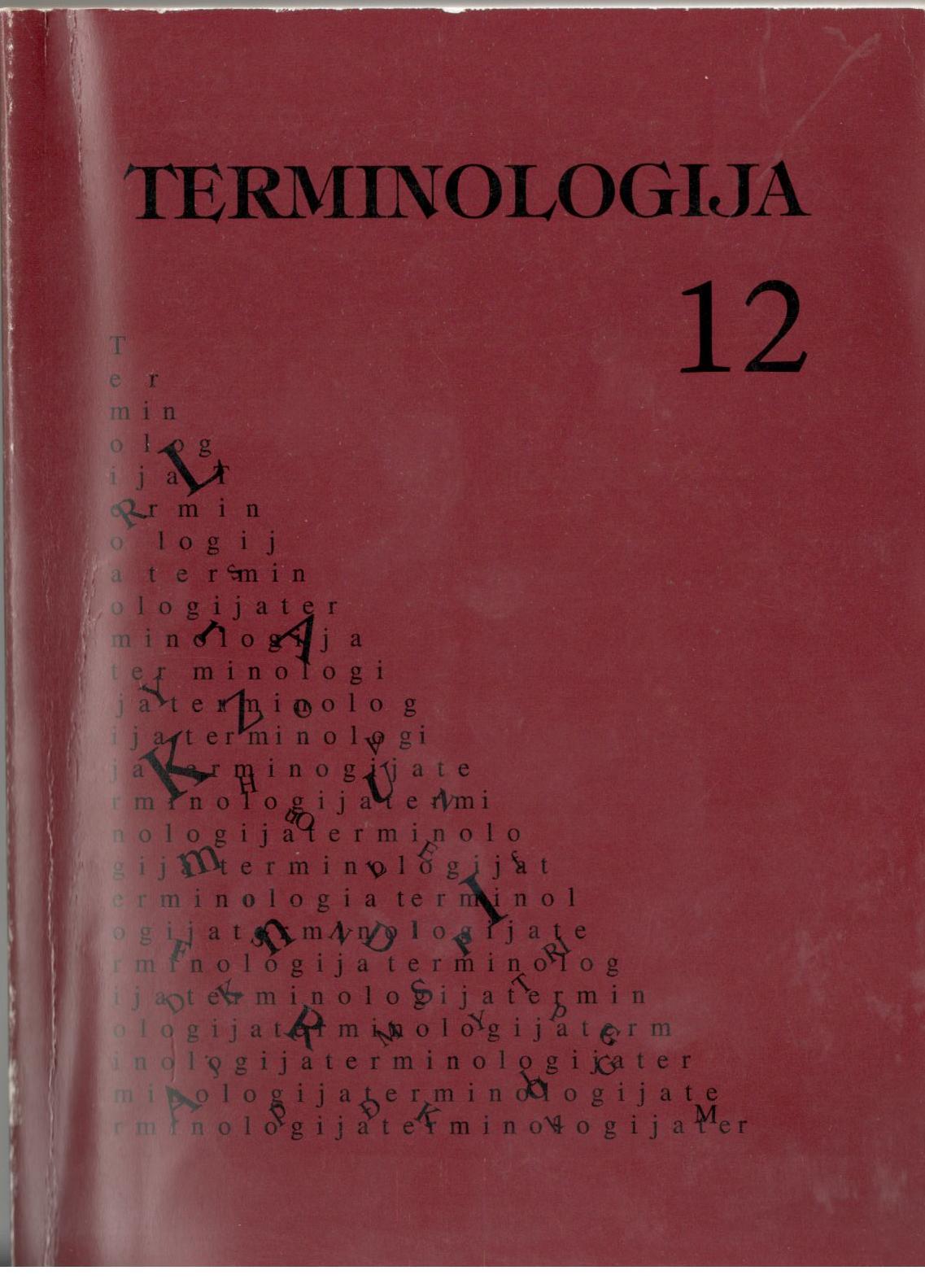Statybos terminijos sinonimija
Synonymy of building and civil engineering terminology
Author(s): Robertas StunžinasSubject(s): Language studies, Language and Literature Studies, Lexis, Semantics, Descriptive linguistics, Baltic Languages, Philology
Published by: Lietuvių Kalbos Institutas
Keywords: synonym; term; synonymous component; lines of synonyms;
Summary/Abstract: This paper analyzes in structure, derivation, meaning and development aspects 1653 different lines of synonyms presented in three term dictionaries of building and civil engineering: 1992 Russian-Lithuanian term dictionary of building and civil engineering, 1993 English-Lithuanian term dictionary of building and civil engineering, 2002 Term dictionary of construction. Considering facts building and civil engineering terminology is characterized by a variety of synonymy. A small number of lines of synonyms in new term dictionary shows steadied synonymy. In respect of derivation of synonymous terms or synonymous components two big groups can be distinguished: heterogeneous synonymy, i. e. lines of synonyms of Lithuanian and borrowed terms and homogeneous synonymy, i. e. lines of synonyms of pure Lithuanian terms. According to structure, derivation and types of synonymy these two groups could be divided into 18 smaller groups. In heterogeneous synonymy three smaller groups dominate: lines of synonyms of single-word Lithuanian and international terms [en aerator - aeratorius, vėdintuvas ALSTŽ 8], lines of synonyms of complex terms with Lithuanian and hybrid components [ekvivalentinis storis, lygiavertis storis - en reduced thickness STŽ 586], mixed lines of heterogeneous complex terms and borrowed single-word terms [hidrantas, vandens kolonėlė - en hydrant RLSTŽ 57]. In lines of synonyms of single-word terms and complex terms borrowed terms are preferred [monolitiškumas, vientisumas (en solidity) RLSTŽ 462; nominalusis skersmuo, vardinis skersmuo - en nominal diameter STŽ 532]. In mixed lines of synonyms complex terms are preferred [drožlių betonas, fibrolitas - en wood fiber concrete STŽ 74]. Linguistically some synonyms are not equivalent [vibruojamasis tankinimas, vibravimas (en compaction by vibration) RLSTŽ 437]. Non-equivalence of synonyms could come from the broadness of borrowed terms, which can be covered by a few Lithuanian terms, and various possibilities of “synonymous” nomination [en freight elevator - krovininis liftas, keltuvas ALSTŽ 125]. During ten years heterogeneous synonymy of building and civil engineering has changed: in many cases in the new term dictionary it is possible to find only one synonym of earlier lines of synonyms [farvateris, laivakelis (en clearway) ALSTŽ 61 - laivakelis STŽ 300]. Furthermore, Lithuanian synonymy strengthened considerably and in many cases in the new term dictionary Lithuanian terms are preferred [konsolė, gembė (en cantilever) RLSTŽ 144 - gembė STŽ 166]. Many synonymous terms in the new dictionary are presented as separate terms [diskas, skridinys (en disc) RLSTŽ 75 - diskas STŽ 122, skridinys STŽ 543]. In homogeneous synonymy three smaller groups dominate: lines of synonyms of single-word terms [aidas, atgarsis - en echo STŽ 14], lines of synonyms of complex terms with synonymous subordinate components [pakopos plotis, laiptelio plotis - en tread width STŽ 430], mixed lines of synonyms of single-word and complex terms [kreivių braižiklis, braižytuvas - en plotter STŽ 81]. In single-word and complex term synonymy lexical synonyms dominate [en blister - burbulas, pūslė ALSTŽ 34], whereas derivative [greitintuvas, greitiklis (en accelerator) RLSTŽ 441] and grammatical synonyms [pramoninė statyba, pramonės statyba (en industrialized construction) RLSTŽ 405] are rather rare. Some derivative synonyms must be eliminated because of categorial polysemy [sunkimasis, sunktis - en percolation STŽ 596]. Typical grammatical synonyms are derivates with the suffix -tinis and the participle [klijuotoji sija, klijuotinė sija (en glueed girder) RLSTŽ 19]. Linguistically some homogeneous synonyms are not equivalent [en cooler - aušykla, aušinimo bokštas ALSTŽ 82]. Non equivalence of synonyms could come from the broadness of borrowed terms, which can be covered by several Lithuanian terms, and synonymy of other language equivalents [aukštuma, pakiluma - en hill, eminence STŽ 60]. During ten years homogeneous synonymy has changed: most synonyms of the earlier term dictionaries are absent in the new dictionary and in many cases the new term dictionary preferres only one term [en foreland - iškyšulys, ragas ALSTŽ 152 - iškyšulys STŽ 207].
Journal: Terminologija
- Issue Year: 2005
- Issue No: 12
- Page Range: 7-26
- Page Count: 20
- Language: Lithuanian

